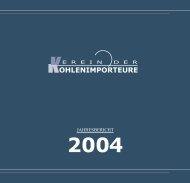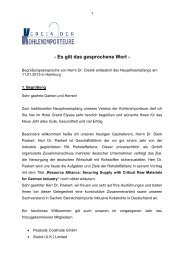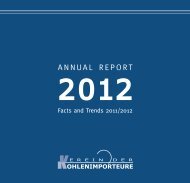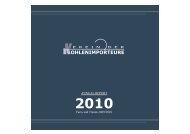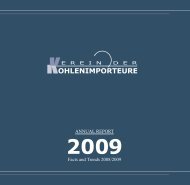Annual Report 2010 - Verein der Kohlenimporteure eV
Annual Report 2010 - Verein der Kohlenimporteure eV
Annual Report 2010 - Verein der Kohlenimporteure eV
You also want an ePaper? Increase the reach of your titles
YUMPU automatically turns print PDFs into web optimized ePapers that Google loves.
European electricity market, overcoming all existing<br />
transit and network obstacles in Europe and<br />
carrying out all necessary infrastructure investments.<br />
<br />
increasingly on imported electricity (of up to 30%<br />
in 2050), without this ever being co-ordinated with<br />
Germany’s neighbours.<br />
<br />
Energy Concept) assume that the lifetime extensions<br />
of German nuclear power plants can be completely<br />
implemented despite political opposition, complaints<br />
and doubts, and that e.g. the development of<br />
Germany’s energy networks and advised renovation<br />
in the building sector will take place without any<br />
slowdown.<br />
<br />
solution of all acceptance problems related to<br />
the required investment projects and that a stable<br />
international context will exist, without e.g. raw<br />
material bottlenecks or shortages, or any surge in<br />
energy prices, and also without any price declines<br />
in fossil energy sources or similar reactions on the<br />
international energy markets.<br />
<br />
fundamental assumptions, such as the successful<br />
realisation of technologies that do not yet exist today<br />
or that will not be commercially available for a long<br />
time: among them are new technologies to store power<br />
via CCS (assumed to be “commercially available”<br />
from 2025), to e-mobility and the standard-setting<br />
zero-emission house.<br />
<br />
depends, in addition to the analysis, on the given<br />
reduction in energy consumption actually being<br />
achieved. This, again, can only occur if the increase in<br />
energy productivity not reached so far becomes a reality,<br />
which presupposes at least a kind of “energy efficiency<br />
<br />
1% per annum average economic growth until 2050<br />
would be detrimental to Germany’s development as a<br />
location for industry and will fortunately be markedly<br />
exceeded in <strong>2010</strong> and probably also in 2011.<br />
With these assumptions, all scenarios on average show<br />
<br />
9.5% respectively, compared with a reference scenario<br />
without climate policy objectives. However, the<br />
potential for error in these 40-year forecasts to 2050 is<br />
clearly much greater than in forecasts for a single year.<br />
No Long-Term Positive Prospects for Coal?<br />
<br />
in the long-term. According to DEBRIV, the German<br />
Brown Coal Association, the draft Energy Concept<br />
should be un<strong>der</strong>stood as “a determined strategy against<br />
coal”. The energy scenarios, being in agreement with<br />
political assumptions, assume 100% use of imported<br />
hard coal as from 2020. Indigenous lignite use declines<br />
after 2020; its contribution to electricity generation drops<br />
drastically and is estimated at less than 1% in 2050.<br />
According to the scenarios, there is still, as mentioned<br />
above, a niche market for hard coal of round about 15<br />
<br />
imported coking coal and coke.<br />
No Investment Security for New Coal-Fired Power<br />
Plants with Combined Heat and Power<br />
According to the Energy Concept, coal-fired power<br />
plants in the future will no longer be used for base- or<br />
mid-load power generation, but instead like gas-fired<br />
power plants especially will be available as “swing<br />
and reserve capacity” for the fluctuating output from<br />
renewables. Nevertheless, sufficient investments in new,<br />
more flexible coal-fired power plants are consi<strong>der</strong>ed<br />
“necessary” to ensure security of supply. This means<br />
also that, “the cost and availability of indigenous<br />
51



